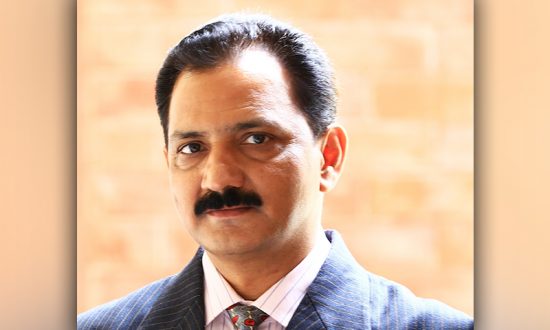Nationwide closures of educational institutions have impacted millions of learners across the world. As there has been an immediate shift from the classroom, many are wondering whether the adoption of online learning will continue to persist post-pandemic, and how such a change would impact the worldwide education market. “The rapid adoption of education technology by higher education institutions has led students to manage and prepare themselves between in-classroom experience to a home-based remote learning environment without any disruptions. This trend is likely to increase in the coming months, and online education will be the preferred and safe choice for both students and their parents,” says Dr Jitendra Kumar Mishra, Director, Jaipuria School of Business. In an email interaction with the Higher Education Digest, Dr Jitendra Kumar Mishra talks about the impact of COVID-19 on education, increase in the adoption of Edu-Tech by Higher Education institutions, how will COVID-19 impact international student migration and many more.
How has been the impact of COVID-19 on Indian Higher Education so far? How will it affect the upcoming academic years?
The pandemic has significantly impacted the higher education sector. The outbreak of the virus and the stipulated lockdown has overburdened the private sector and has put immense stress on them. With parents not being able to pay fees on time and with several government directives that have refrained Institutions from taking fees from parents, the Institutions are finding it difficult to pay the regular salary to their faculty, staff members, and others.
Furthermore, the rising health crisis is causing depression and majorly affecting the education of the students. The educational sector needs to draft new policies and look out for the enhancement of roles of the institutions to remotely manage students and teachers post COVID-19. The switch to the online classes is undoubtedly helping students suffer no loss of studies, but it is impacting their overall development.
The current academic session is going through a great deal of uncertainty. The government guidelines on conducting/not conducting the examination, commencement of new session, calendar, conducting classes on campus or online are changing every now and then further adding to the confusion and uncertainty. To make sure that this pandemic will not impact the upcoming academic year, we need to focus on protecting the mental health of the students and give them counselling classes regularly. The government of India is constantly trying to come up with solutions to resolve this problem.
There has been an increase in the adoption of Edu-Tech by Higher Education institutions across the country. How do you see this trend? What are the efforts of Jaipuria Group of Institutions in this regard?
The rapid adoption of education technology by Higher Education institutions has led students to manage and prepare themselves between in-classroom experience to a home-based remote learning environment without any disruptions. This trend is likely to increase in the coming months, and online education will be the preferred and safe choice for both students and their parents.
Jaipuria School of business is very well equipped digitally. We have a high-quality digital infrastructure which helped us to quickly switch to online classes early during the lockdown. The institute is not only continuing but improving with the increasing learning of its use.
Do you think the gaining popularity of online learning will affect the demand for traditional educational institutions? How can our universities utilize both conventional and online learning for the benefits of our students?
Online and traditional learning both play a vital role, but amidst the crisis, online learning has increased the scope of education and transcended it beyond classroom boundaries. Gaining popularity of online learning is helping students to keep up with their learning. It is also proving to be efficient in acquiring knowledge and a few skills, however, for behavioural change, attitudinal change, development of cognition, and experiential learning the conventional form of learning on campus and residential programmes would be required. Thus, it looks like to be blended learning in the future ahead wherein both the forms of education shall not only survive together but excel as well.
Accessibility has been the biggest challenge for students from rural parts of the country during this time of the pandemic. How can we solve the problem of the digital divide between urban and rural India?
As technology becomes progressively reasonable and internet access seems increasingly ubiquitous, the ability to access smartphones, laptops, and the internet has become crucial for society. Tragically, in rural India, exposure to the internet remains largely inaccessible, contributing to the challenge of a digital divide. The long term solution to the digital divide is in tackling the glitches of poverty, illiteracy, low internet density, and physical access to ICT, which are inextricably linked for this urban-rural divide in India.
However, for an immediate solution, providing access to proper internet infrastructure, making technology and devices available for lower-income earners may be useful. As a large number of people in rural areas lack the necessary prerequisite education to understand a lot of online content, to synergize internet adoption in such places; local content and applications need to be developed in local languages that can be understood by the local populace. To make this technology accessible, affordable, and secure for public use in rural India, the government must move swiftly in executing the essential framework and competency.
How COVID-19 will impact international student migration? Are we going to see more international students preferring India as their education destination?
The global uncertainty has adversely affected the education sector and academic cycle, which will cause major disruption for international student migration. Both parents and students being scared of the virus will prefer to stay in their own countries or opt for distance learning courses. It is likely to be in favour of home institutions in terms of a relatively higher number of enrolments. There will be an upward trend in online education and distance education, and it will become a preferred choice of learning for students across the world.
Post-COVID, due to expected restrictions on emigration delay in the international admission process, are we going to see more Indian students opting to stay back and study in Indian universities? What is your take on it?
Leverage Edu, an Edu-tech platform, conducted a study that reveals that about 91% of the Indian students are still holding on their aspirations even amid the Covid-19 lockdown. Though the students are aware of the steps being taken by international universities as a safety measure, they are hesitant to study abroad.
Some may consider postponing the decision because of the Covid-19 outbreak, but most of them are looking forward to studying abroad. Students also take into account that some of the international universities have been around for many years and several centuries. They have seen global crises before and have only come out of it stronger.
What are the opportunities for Indian universities post-COVID? How we utilize these opportunities to become one of the best higher education systems in the world?
This crisis offers a rare opportunity to re-envision and expand academic independence in Indian university space. The standards and quality of education in universities need to be revisited and redefined to match the best globally. Also, considering the sea changes happening in the industry, education has to be revamped to meet the requirements of the Industry 4.0/5.0. It demands to reinvent every single function and facility. It is not just the shape, size, and form of the classroom that has to change, but also what to be taught and how it will be taught. The “new normal” will see several more unanticipated inversions.
About Dr Jitendra Kumar Mishra
 Dr Jitendra Kumar Mishra has a wide range and depth of experience in various facets of Academia. His experience has spread over a period of two decades. Being a vibrant learner, in the course of his professional journey, he has gained proficiency not only in different aspects and nuances of teaching, research, administration and institution building but also in handling cross-cultural scenarios as he has worked with people having a varied cultural background in India.
Dr Jitendra Kumar Mishra has a wide range and depth of experience in various facets of Academia. His experience has spread over a period of two decades. Being a vibrant learner, in the course of his professional journey, he has gained proficiency not only in different aspects and nuances of teaching, research, administration and institution building but also in handling cross-cultural scenarios as he has worked with people having a varied cultural background in India.
Being a researcher himself, he has published over 40 research papers in reputed national and international journals. His areas of research include Economic Policy, International Business, Higher Education, Consumer Behaviour, Materialism, Climate Change, Sustainable Development and Economics of Happiness.
He has delivered the Invited Talks, Keynote Talks and functioned as a Resource Person for different programmes, conferences and seminars organized by reputed management institutes, Universities; and professional bodies such as ISTD, AICTE and NHRD.




